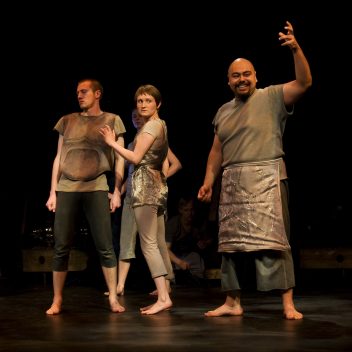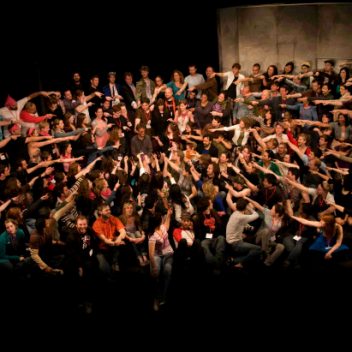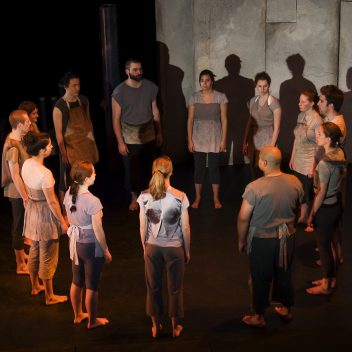
Image: Kristian Messere in Harmonia from City of Wine (John Lauener)
City of Wine
By Ned Dickens
City of Wine is a nine-play cycle telling the story of the Greek city of Thebes – best known as the home of Oedipus. Beginning with the founding of Thebes by Cadmus and Harmonia, and ending in the city’s demise seven generations later on the battlefield of Troy, City of Wine provides a powerfully relevant commentary on justice, leadership and civic life. Alarming, funny, sexy, thoughtful and exceptionally moving, the plays offer vivid reflections on all that it means to be a citizen, those who lead us and how we respond (or not) to that leadership.
This contemporary look at some of western literature’s most remarkable characters breathes new life into their stories while introducing the citizenry of Thebes as distinct yet familiar individuals, an approach to the ‘chorus’ that is unique to Ned’s vision of this legendary city. Ned has conceived the nine plays of City of Wine as three trilogies: GRAPE: Harmonia, Pentheus, Thebe; VINE: Cadmea, Laius; Jocasta; WINE: Oedipus, Creon and Seven.
Production History
City of Wine Festival
Produced by Nightswimming
Theatre Passe Muraille, Toronto
The City of Wine festival featured two complete runs of the then seven-play cycle between May 5-9, 2009.
Written by Ned Dickens
Artistic direction & Dramaturgy by Brian Quirt
Produced by Naomi Campbell
Festival Set Design by Vikki Anderson
Festival Lighting Design by Rebecca Picherack
Production Management by Caroline Hollway
Associate producer Rupal Shah
Dramaturgy & sponsorship by Marie-Leofeli R. Barlizo
Wardrobe coordination by Linda Muir
Transportation & volunteer coordination by Jill Ward
Stage coordination by Sandy Plunkett & Michael Wheeler
Read the City of Wine festival programme here to read full cast and company credits and additional information on City of Wine.
Nightswimming commissioned a French-language translation of Harmonia by University of Ottawa playwright Michel Ouellette. The National Arts Centre (Ottawa) co-commissioned with Nightswimming the play Laius.
Creon received a production at Humber College, directed by Alex Fallis, in 2002.
Jocasta received a production at the University of Alberta, directed by David King, with Mieko Ouchi as Jocasta, in 2004.
Creon was produced in Toronto by Stone Circle Productions, directed by Vikki Anderson, in 2006.
Seven received a student production at the University of Toronto by the UC Follies in the University College Quad, in 2017.
Seven was produced in 2021 in Kingston, Ontario, in an outdoor production directed by Ned Dickens.
Publication
Read more about City of Wine in Maclean’s, NOW Magazine and The Toronto Star.
For a post-festival examination of the productions and their impact, read Alex Fallis’ article ‘Without our past….’ from Canadian Theatre Review 142, Spring 2010.
For Brian Quirt’s perspective on the entire project, read his article “Huge”.
For information about specific scripts, please contact Nightswimming Producer Gloria Mok at gloria@nightswimmingtheatre.com.
Dramaturgy and process
Playwright Ned Dickens and dramaturg Brian Quirt began work on the cycle in 1994 when Die in Debt Theatre (Toronto) commissioned Ned to write a new version of Oedipus for an outdoor production (directed by Sarah Stanley, with Brian as dramaturg) that was presented to great acclaim under the Gardiner Expressway that summer. Receiving the Dora Mavor Moore Award for Outstanding Production, Ned’s Oedipus was a masterful and unusual retelling of the story, and one that inspired him and Brian to examine more deeply the story of Oedipus’ wife Jocasta, and the story of Jocasta’s brother Creon. These conversations led Ned to conceive of two companion plays: Jocasta, telling the story of Oedipus’ birth and the love affair that unites him with Jocasta; and Creon, a revisionist look at the story of Oedipus’ daughter Antigone.
Nightswimming began work on what Ned was now calling City of Wine in 1997 when we commissioned him to write Jocasta (cast of 15), a prequel to his version of Oedipus. We commissioned Creon in 1999 (cast of 8), and workshopped both plays and Oedipus (cast of 16) in 2000, with a major public reading of that trilogy. We then established a three year developmental partnership with the Stratford Festival, and held a series of workshops and public readings there of each play in the trilogy.
As Ned developed the first three plays, he continued to look both forward and backward in Theban history, discovering that the legendary city had a lifespan of not much more than seven generations. Looking at the richness of stories generated by the ancient Greeks about this extraordinary city, Ned conceived of a further four plays that trace the city’s life from its founding by Cadmus to the demise of its last residents on the battlefields of Troy.
Nightswimming subsequently commissioned Harmonia (cast of 12, 2005), Pentheus (cast of 18, 2006) and Laius (with the National Arts Centre; cast of 14, 2006) and Seven (cast of 7, 2007), and developed each with Ned separately and as a cycle of seven plays.
Throughout the entire process of creating City of Wine, Brian served as dramaturg and workshop director. Naomi Campbell served as producer while contributing substantially throughout to dramaturgical discussions and the design of the development process.
As the project went from 3 to 7 plays, we became very aware that the demands of the cycle required larger casts, even longer time periods to enable the plays to evolve in response to one another, and to be seen on stage in order to fully complete the creation process.
We embraced the hugeness of this project, and the dramaturgy of its epic scale, both in terms of storytelling, but also logistics and play development. With 96 speaking roles, the cycle became too big for any producing company to develop, but because Nightswimming is not a producing company we were able to focus whole-heartedly on how these stories worked together across seven plays and never asked Ned to reduce the work or his vision of it.
With this in mind, Brian and Naomi established the City of Wine Project, which focused on the development of all seven plays, and ran from 2006-2009. During this period, Nightswimming set up creative partnerships with 7 theatre training programs across Canada. Over three years, Nightswimming visited each program several times to conduct workshops on the plays and train the students in our approach to dramaturgy and play development.
In 2007 Nightswimming produced an invaluable week-long workshop in Toronto of all seven plays bringing together dramaturgical insights from the combined contributions of more than 100 professional actors who had participated in sessions over the decade since we commissioned Jocasta in 2007, plus ideas gleaned from our initial work with each of the seven theatre school classes, comprising an additional 100 student actors and artists.
In the final year of the project, each school committed to produce one of the plays as part of their 2008/09 theatre season. Brian, Naomi and Ned attended each show in rehearsal and returned for opening night. In May 2009, Nightswimming brought these seven productions (and more than 165 students) to Toronto’s Theatre Passe Muraille, where the seven play cycle was performed in its entirety twice over the course of six days as the City of Wine Festival.
Following this massive endeavour – perhaps Canada’s largest workshop production ever! – Brian collated his dramaturgical notes on the seven plays from watching the festival, and incorporated comments from faculty, students and audience members. Ned then undertook the daunting process of revising all seven plays in the light of these dramaturgical notes, plus his own extensive observations of the plays in action. This revision process took more than two years, and has resulted in production-ready scripts for the full cycle.
In 2021, members of the Kingston, Ontario, community where Ned lives came together to read all seven plays on Zoom. Bringing these timely plays alive was a fabulous example of a community coming together to explore stories that examine all the complexities of how communities come together (and fall apart).
Nightswimming is proud to have supported these readings and the outdoor production of Seven, directed by Ned, that took place in Kingston from August 10-15, 2021.
And so the cycle continues…. Ned has further developed the cycle to encompass nine plays, adding Thebe and Cadmea to the original seven, and structuring the cycle in the form of three trilogies. In 2023, The Grapevine Theatre Project is producing an updated version of Harmonia, directed by Nigel Shawn Williams (who has had a long association with cycle, going back 20+ years to an early reading of Jocasta).
You can also follow the progress of Grapevine Theatre and the Kingston community as it engages with City of Wine by joining the City of Wine: Kingston page on Facebook.
City of Wine Festival
This national project offered a once-in-a-lifetime opportunity for more than 165 students to participate directly in the development and production of a new play in partnership with leading theatre artists and their fellow students across the country. To accomplish this Nightswimming established relationships with the following theatre training programs: Grenfell College (Corner Brook, Nfld); Concordia University (Montreal); George Brown College Theatre School (Toronto); Humber College Performance Training Program (Toronto); York University (Toronto); Studio 58 (Langara College, Vancouver) and Simon Fraser University, Contemporary Arts (Vancouver). The National Theatre School of Canada (Montreal) and the University of Alberta (Edmonton) also participated in early phases of the project.
This project brought together students from across Canada to develop, rehearse, produce and present Ned’s seven plays. A central element of this initiative was Nightswimming’s plan – never before attempted on this scale – to take Ned and Nightswimming staff into each school to workshop the plays with the students, and in doing so to incorporate students in the creation of a major new work of theatre as part of their training.
This collaborative educational process culminated in 2008-09 when the seven plays were produced by seven of the schools. City of Wine challenged students to work at the highest standard possible in collaboration with professional artists and institutions, and offered them not only mentorship, but brought them in contact with their fellow students from across Canada.
Read the City of Wine festival programme here to read full cast and company credits and additional information on City of Wine.
Synopses of Seven Plays
Harmonia – Daughter of the gods Ares and Aphrodite, Harmonia and her mortal husband Cadmus are the founders of Thebes. In the kitchen of Ares’ palace on Mount Olympus, surrounded by the lusty desires and petty games of both gods and mortals, Cadmus wins the love of Harmonia but incites the fury of the gods. Harmonia gives up her immortality to pursue this love as she and her new husband are driven from Olympus. They vow to found a great city dedicated to equality and truth – and thus Thebes is born. A great love story merges with a search for freedom in this beautiful and romantic start to the cycle.
Commissioned by Nightswimming. Student production by SFU Contemporary Arts at Simon Fraser University, Vancouver, directed by DD Kugler.
Pentheus – An alternative version of the events of The Bacchae, this play introduces us to Harmonia and Cadmus’ grandson Pentheus, who finds himself chosen king just as the city is undergoing an unexpected transformation. Also brought to life are the magical characters of Tiresias, the seer whose prophecies play a pivotal role in the city’s story, and Bacchus, the god whose gift of wine brings both joy and chaos to Thebes. The tragedy of King Pentheus (and a hidden love story!) brings Thebes into a new era.
Commissioned by Nightswimming. Student production by Humber College, Toronto, directed by Tatiana Jennings.
Laius – Laius, the great grandson of Cadmus and Harmonia, is next in line for the crown. However, after a botched coup attempt, Laius is driven into exile, where he festers in bitterness and self-pity until he commits a crime that will haunt Thebes and its people for generations. How do we create our leaders and what do we demand of them in return? This play is central to the City of Wine – much wine is consumed as the people of Thebes struggle within this crisis of leadership.
Commissioned by Nightswimming and the National Arts Centre. Student production by George Brown Theatre School, Toronto, directed by Eda Holmes.
Jocasta – This play illuminates the story of Jocasta, one of the great figures of ancient mythology. Twenty years after the events of Laius, the exiled Laius returns to Thebes, marries Jocasta and she bears him a son. The first act of Jocasta traces the descent of the city, under Laius’ rule, into dictatorship and despair. Act two brings with it a much-discussed moment in Greek mythology: the charming and magnetic first meeting between Jocasta and Oedipus. With no idea what their relationship portends (for themselves or for Thebes) their happy marriage restores peace to the city.
Commissioned by Nightswimming. Student productions by Studio 58 at Langara College, Vancouver, directed by Craig Hall; University of Alberta Theatre Department, directed by David King (2004).
Oedipus – Oedipus’ attempt to relieve Thebes of a plague, and the curse that brought it to the city, brings the famous story of Jocasta, Laius and Oedipus to its disastrous and horrifying conclusion. One of the world’s great tragedies finds new life in this thrilling new version.
Commissioned by Die in Debt Theatre. Premiere production by Die in Debt Theatre, Toronto, directed by Sarah Stanley. Student production of revised script by Concordia University Department of Theatre, Montreal, directed by Ulla Neuerburg-Denzer.
Creon – On a pleasant evening, years after the events of Oedipus, a visiting stranger enters a peaceful tavern and acquaints himself with the Thebans savouring the local wine. His questions about their city and their history result in an impromptu and often comic reconstruction of the story of Antigone. A controversial story about leadership is re-evaluated and the fate of Thebes is explored, disputed and reinvented. Once again, wine points the way, bringing both chaos and, finally, good cheer in its wake.
Commissioned by Nightswimming. Premiere production by Theatreworks, Toronto, directed by Vikki Anderson (2007); student productions by Sir Wilfred Grenfell College, Memorial University, Corner Brook, Newfoundland, directed by Jillian Keiley; Humber College, Toronto, directed by Alex Fallis (2002)
Seven – During the siege of Troy, seven scruffy citizens sit drinking around a campfire. After receiving orders to go on a futile and certainly fatal mission in the morning, the seven Thebans spend their last night trying to make sense of their lives, their place in history and in memory. Will wine offer insight or blindness? How will they meet the challenge that dawn brings? What will remain of Thebes after they are gone?
Commissioned by Nightswimming. Student production by York University Department of Theatre, Toronto, directed by Sarah Stanley.
One of 2009’s theatre highlights. Here’s a toast to Bacchus in hopes that the cycle has continued life, for what we saw was an extraordinary piece of theatre as well as an epic undertaking.
NOW Magazine
This amazing project has been in gestation for 15 years, thanks to the caring arms of Brian Quirt and Naomi Campbell at Nightswimming and the boundless invention of author Ned Dickens.
The Toronto Star
Ned Dickens has devoted seven plays, and 16 years of his life, to retelling the tale of Thebes, a sex-and-blood-drenched saga that peaks in the story of Oedipus but starts generations earlier. All seven are now being mounted in sequence in Toronto, in a kind of super-workshop, by seven different theatre schools from around the country, under the auspices of the professional company Nightswimming. It’s a dizzyingly ambitious feat of producing and, despite inevitable unevenness in writing and production, a dizzying achievement.
As with any good cycle, the more you see, the more you want to see. Dickens’ commitment to telling and linking his stories pays tremendous dividends. I’ve never before been as gripped or as shocked by the self-undoing of Oedipus, who appears in two plays and is well played in both — though by two different actors. The future of this project, however fearsome the logistics, must be a full professional production with consistent casting.
The National Post


